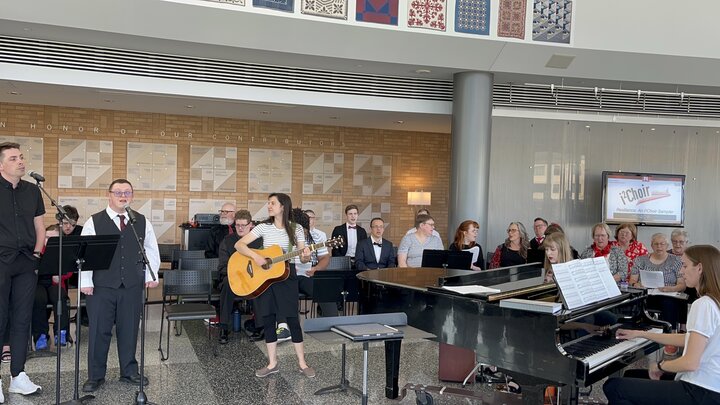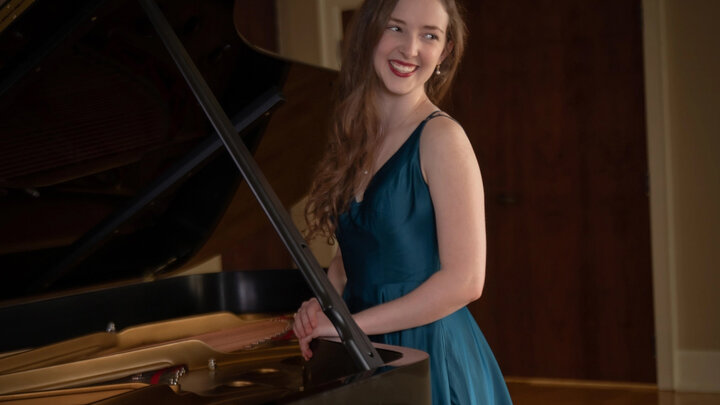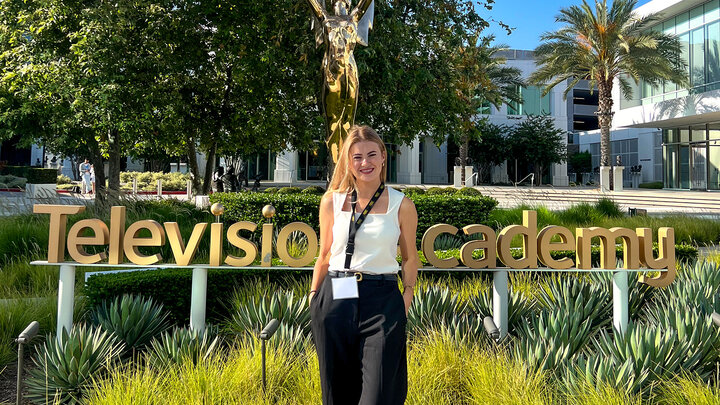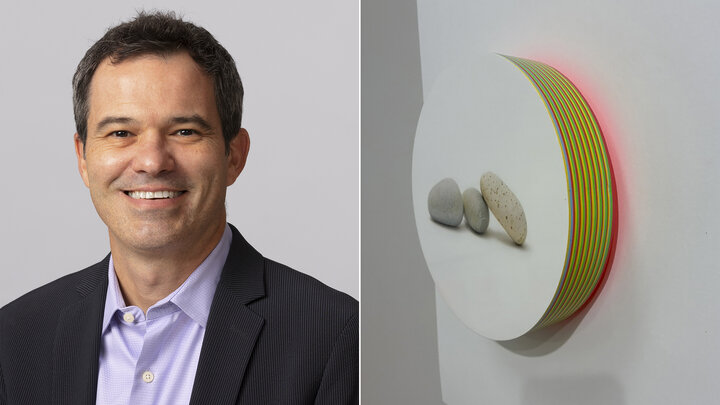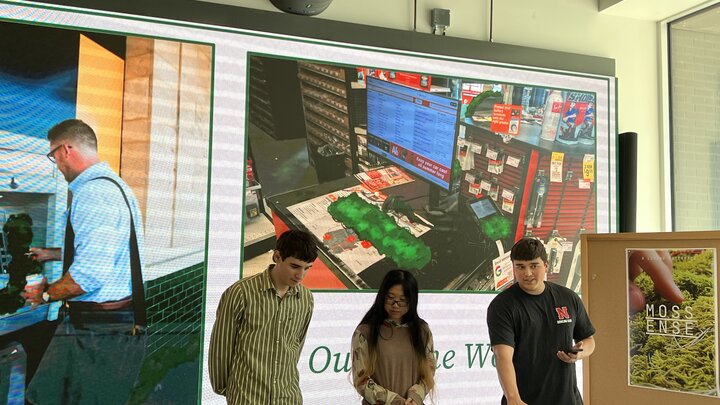Lincoln, Neb.--The inclusive practices of the Glenn Korff School of Music’s music education program are featured in the International Journal of Music Education in an article written by music education professors Rhonda Fuelberth and Robert Woody. The article is available online now at https://go.unl.edu/musicedjournal and will be included in an upcoming issue of the publication.
“The article stemmed from trying to define what makes our music education program unique at Nebraska, and inclusive practices, in all its forms, is really what makes our program unique,” said Fuelberth, associate professor of music education and associate director of graduate studies in the Glenn Korff School of Music. “Inclusion of all people as deserving of a music education, of all music as being valid, and inclusion of all types of musical engagement, whether that is creating or performing or responding to music.”
The article focused on three examples of their inclusivity. First is how music education affirms composition as a primary form of musicianship and as an alternative to performance. The second example is a vernacular music-making experience in which music education students learn to play “rock band” instruments, engage in songwriting and explore being expressive in the styles of music personally favored by themselves and their future students. Third, music education students can work with an intergenerational choir called i2Choir, which is inclusive of individuals with special needs.
Fuelberth founded the i2Choir 10 years ago. The two “i’s” stand for inclusive and intergenerational with a tagline of “Exponentially Better Together.” The choir, which rehearses and performs at the International Quilt Museum, creates a naturally inclusive music-making opportunity where individual contributions are valued, musical growth is championed, and all members become partners in the experience of creating high-quality music. Using the principles of Universal Design for Learning, musical growth activities are designed to maximize the learning potential for everyone who participates.
“The i2Choir is just so awesome. It broadens the horizons of what the choral world has valued for so long. I treasure it in the music education world because it’s exactly what music educators should be doing,” said Woody, the Steinhart Foundation Distinguished Professor of Music and Music Education and co-area head (undergraduate). “Rhonda is listed as the founder and director. I like that word founder. She is the director, and she does a lot to make it happen, but she’s not the director in the conventional sense that she’s up there running everything.”
“It actually speaks to really trying to focus on a shared ownership, and that the contributions of the members and their ownership of the ensemble is a high priority,” Fuelberth said. “One example of that, we have a musician named Caleb, who plays piano. He possesses a skill and a way that he engages in music that I would aspire to—to be able to hear something and be able to play it within moments. And so rather than prescribe what we might typically do in a choir, where we purchase an arrangement and ask Caleb to accompany us, we instead ask him to choose a piece that he wants to do with us, and then I modify the arrangement for what the choir will be doing based on his performance. And it’s working so well.”
Woody offers a one credit hour “mini course” titled Popular Musicianship. Though it’s an elective, about 90% of UNL’s senior music education majors have elected to enroll in it. In the course, students organize themselves to form “rock bands” and perform two to three songs of their choosing, including a cover of a popular song and one original song. The students learn themselves how to play the instruments, including electric guitars, electric bass and a drum set. Although there is a public performance, the course is more about the music-making process than the musical product.
“In the rock band experience, what’s scary for me is that I don’t possess the rock band skills to teach it,” Woody said. “I set up the challenges and give them the resources to do it, and then they just run with it.”
While higher education tends to value specialization, music education values breadth and diversity in music education for all people.
“Our composition education initiative means that music education students can have composition as an applied area, instead of performance on an instrument, and we added a composition methods course to our usual trio of instrumental methods, choral methods and general music methods,” Woody said. “Composition is a valid way of doing music. Music education has too often prioritized the performance of other people’s music, of professional composers, at the exclusion of letting students create their own music, so I really like the composition idea.”
Fuelberth said that has been reinforced through the restructuring of the national standards in public and private schools.
“The profession’s prioritization of composition and improvisation places creating as the first listed standard for engaging in music,” she said. “Because of that focus on these artistic processes of creating, performing and responding, that has really permeated all of the methods courses that we are offering.”
A key to all of these programs, Woody said, is a focus on learner-centered education.
“Education talks about being learner-centered, but too often, I think teachers or directors swoop in and say, well, I know what’s best for the learners so we’re going to do what I think because that’s what is best for them,” Woody said. “We try to put our money where our mouths are on that. It can be a little scary sometimes.”
“And it can be a little disconcerting for our students, too. It takes a little adjustment,” Fuelberth said. “But it can also be liberating and exciting for them to see people come from the community and just want to be there for no other reason than they enjoy singing and enjoy each other.”
Senior music education students, many of whom also elect to participate in the popular musicianship class, also participate in i2Choir as an option for completing requirements for the course Music and Special Education.
Fuelberth and Woody are also encouraged by how UNL music education alumni are now bringing these types of programs, like inclusive choirs, to their own schools now.
“It’s exciting to see that becoming a model,” Fuelberth said. “That was our intention. People don’t come to i2Choir because they just want to socialize. They come because they get better, and they learn, and they produce something that they’re proud of and want to work hard.”
The i2Choir and Popular Musicianship course also create valuable opportunities for music education students to grow as future educators.
“In the case of i2Choir participation for our music ed students and the rock band participation for our students, it’s elective,” Woody said. “They choose to do this, and the vast majority of them choose to do it. Some of them want to do it because they think it will be fun, or they saw last year’s seniors do it. But then they get into it, and they learn from it. And that’s why I did the research cited in the article. I wanted to make sure students were getting something out of it. And what really pleases me is that they are thinking about how it’s going to affect their teaching in the future. We love doing these things because it’s rewarding to us to see the young people we care about growing, but it’s really empowering our music ed students.”
“And making a difference in the schools in which they teach,” Fuelberth said.
